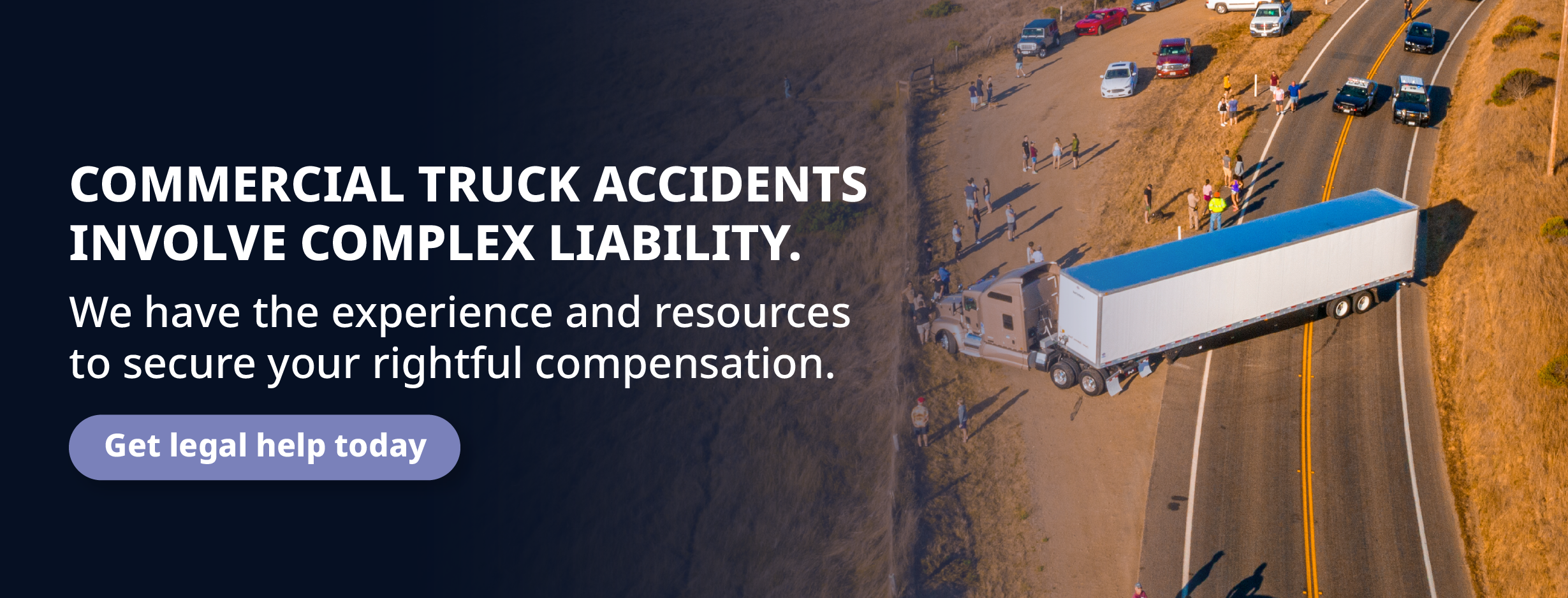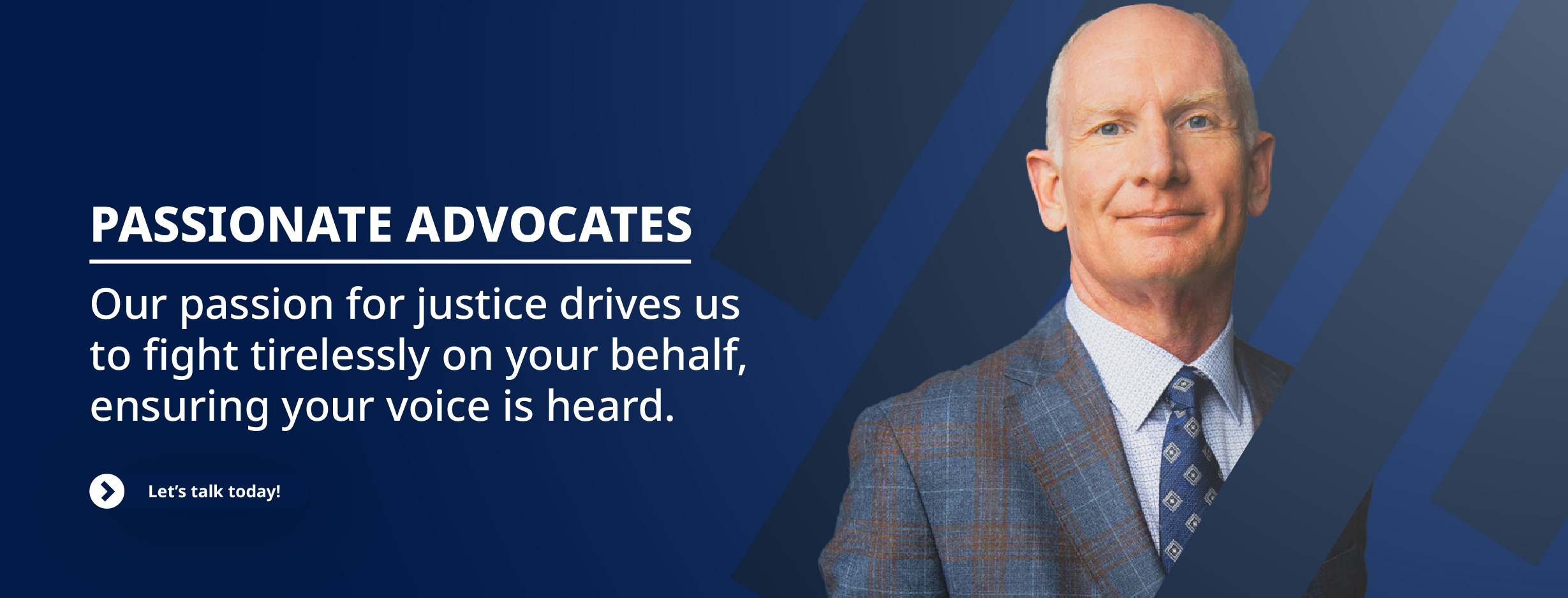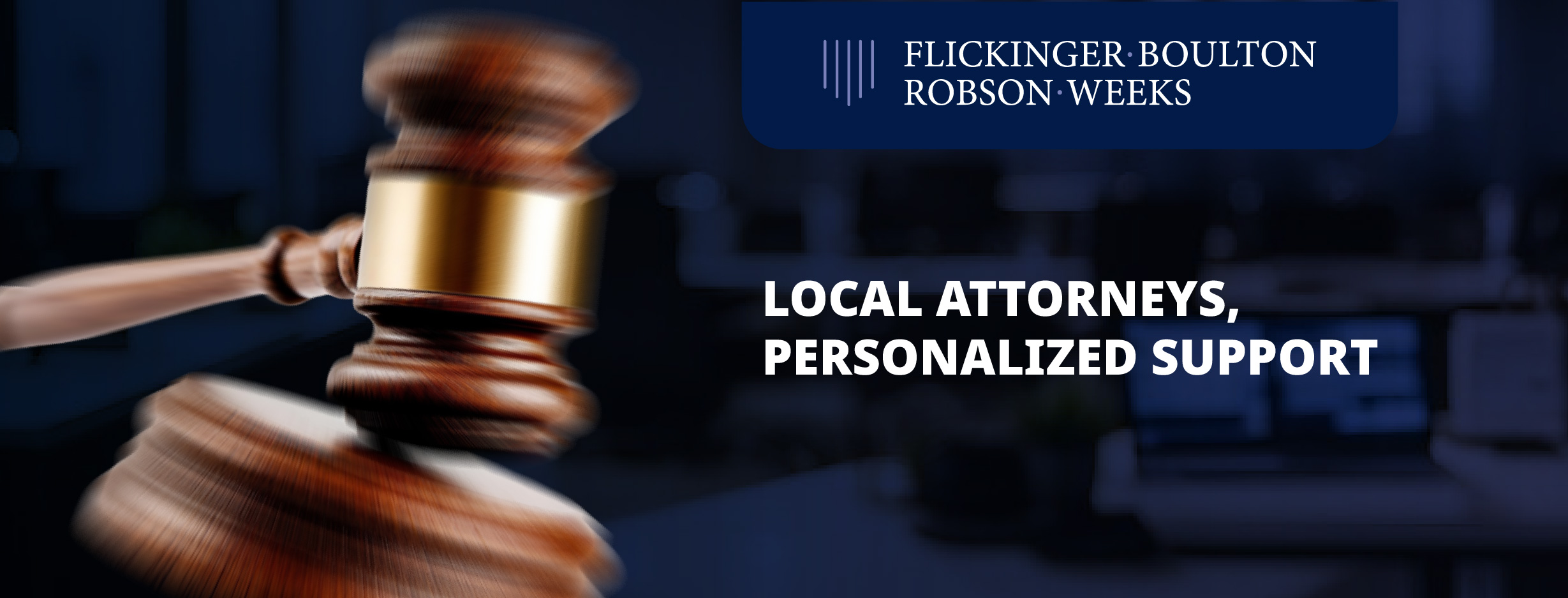¡Hablamos Español!
Collisions involving large commercial vehicles can be some of the most devastating accidents on Utah’s roads. Due to their massive size and weight, commercial trucks can cause severe injuries, extensive property damage, and even fatalities when involved in a crash.
Unlike standard car accidents, these cases often involve complex liability issues, federal regulations, and multiple responsible parties, making legal representation essential.
At Flickinger Boulton Robson Weeks, our experienced Utah truck accident lawyers understand the challenges victims face after a commercial truck accident.
We fight to hold negligent trucking companies and drivers accountable while securing the maximum compensation for injured victims. Contact us today to discuss your legal options if you or a loved one has been hurt in a large truck accident.
Accidents involving semi-trucks and 18-wheelers are far more complex and dangerous than standard car accidents. Due to their massive size, unique operating requirements, and strict federal regulations, these crashes often lead to severe injuries, multiple liable parties, and complicated legal claims.
Below are the key differences between semi-truck accidents and regular vehicle crashes.

One of the most significant differences between semi-truck accidents and regular car crashes is vehicle size and weight disparity.
Unlike regular motorists, semi-truck drivers and trucking companies must follow federal regulations set by the Federal Motor Carrier Safety Administration. These laws govern:
Drivers have limits on how long they can operate a truck before mandatory rest breaks.
Trucks must follow strict weight limits and securement rules to prevent loads from shifting.
Regular safety inspections are required to prevent mechanical failures that could lead to accidents.
If a truck driver or company violates these regulations, it could be used as evidence of negligence in an accident claim.
Due to the size and force of an 18-wheeler crash, injuries are often much more severe than in a typical car accident. Common injuries include:
These injuries often require long-term medical treatment, leading to extensive medical bills, rehabilitation costs, and lost wages.
Unlike regular car accidents, where fault is usually between two drivers, semi-truck crashes can involve multiple liable parties, including:
Because of these complex liability issues, victims need strong legal representation to hold the responsible parties accountable.

Trucking companies carry high-value insurance policies, often in the millions of dollars, because of the damage these vehicles can cause. However, this also means their insurance providers fight aggressively to limit payouts. Insurance adjusters may:
Unlike typical car accident claims, semi-truck cases require skilled negotiation and strong legal strategies to ensure victims receive fair compensation.
Semi-truck and 18-wheeler accidents are far more complex than regular car crashes due to their size, federal regulations, severe injuries, and multiple liable parties. If you’ve been involved in a truck accident, working with an experienced attorney who understands these complexities and can fight for the full compensation you deserve is essential.
Determining liability in large commercial vehicle accidents is more complex than in standard car crashes. These cases often involve multiple responsible parties, strict federal and state regulations, and high-value insurance policies. Identifying who is at fault is critical for securing compensation for medical expenses, lost wages, and other damages.
Unlike typical car accidents, commercial truck accidents may involve multiple parties who share responsibility. Potentially liable parties include:
To establish liability, a victim must prove negligence, which involves four key elements:
Evidence such as black box data, driver logs, vehicle inspection reports, and eyewitness statements can help establish negligence.
Because truck accidents often result in high-dollar claims, trucking companies and their insurers frequently dispute liability. Common defenses include:
Because of these challenges, having an experienced truck accident lawyer is crucial to countering these tactics and proving fault.
Liability in large commercial vehicle accidents can be difficult to determine due to multiple responsible parties and aggressive insurance companies. Proving negligence requires thorough investigation and assertive legal representation.
If you’ve been injured in a truck accident, working with an experienced attorney can help ensure that all liable parties are held accountable and that you receive the full compensation you deserve.
When a truck accident occurs, determining liability and negligence is often complex. Unlike regular car accidents, where witness statements and police reports play a significant role, trucking accidents require specialized evidence to prove fault.
Two of the most critical pieces of evidence in these cases are black box data and maintenance records. These records provide crucial insights into driver behavior, vehicle condition, and potential violations of federal trucking regulations, all of which can strengthen a victim’s claim.
Most commercial trucks are outfitted with Electronic Control Modules or Event Data Recorders, commonly referred to as black boxes. These devices automatically record real-time data about the truck’s performance and driver actions before and during a crash.
Black box data can reveal:
This data is critical for proving negligence. For example, if a truck is involved in an accident on I-15 near Salt Lake City, the black box data could reveal that the driver exceeded the speed limit or failed to brake before impact, strengthening the victim’s claim.
Additionally, if critical data is missing or appears to have been altered, it could suggest that the trucking company is attempting to conceal evidence, which may further support the case for negligence and liability.

Trucking companies are required by federal and state laws to keep their vehicles in safe operating condition. Regular maintenance and inspections are essential to prevent mechanical failures that could lead to accidents. Maintenance records can help identify the following:
Suppose maintenance records show a truck had known mechanical issues that were ignored or improperly repaired. In that case, the trucking company can be held liable for failing to maintain a safe vehicle.
Although black box data and maintenance records can prove to be substantial evidence, trucking companies are not always willing to share them. Some may attempt to:
Delay releasing data to reduce its usefulness in an accident claim.
Destroy or erase black box information, even though tampering with records is illegal.
Alter maintenance logs to make it seem as though the truck was properly maintained.
This is why it is crucial to act quickly after a trucking accident. A truck accident lawyer can send a legal demand (spoliation letter) to preserve evidence and prevent the trucking company from deleting or modifying critical records.
By obtaining black box data and maintenance records, a lawyer can:
Show that the driver or trucking company violated safety regulations
If the trucking company denies fault, data can expose their liability
Hard evidence makes it more difficult for insurers to dispute claims
This evidence can often mean the difference between a denied claim and full compensation for medical expenses, lost wages, and pain and suffering.
Black box data and maintenance records are critical evidence in trucking accident cases. They can prove driver negligence, reveal mechanical failures, and expose violations of federal regulations. However, obtaining this evidence can be challenging, as trucking companies may attempt to withhold or destroy it.
If you or a loved one has been injured in a truck accident, working with an experienced truck accident attorney is essential to securing and preserving this vital information and ultimately winning the compensation you deserve.
Victims of semi-truck accidents often suffer severe injuries, financial hardships, and emotional distress. Due to the size and weight of commercial trucks, these accidents frequently result in catastrophic harm, requiring extensive medical treatment and long-term care.
You may be entitled to significant compensation to cover your losses if you’ve been injured in a semi-truck accident.
Truck accident victims can pursue economic and non-economic damages, depending on the severity of their injuries and the circumstances of the crash.
Economic damages cover measurable financial losses caused by the accident, including:
Non-economic damages account for emotional and physical suffering that doesn’t have a direct financial cost, such as:
In cases involving gross negligence or reckless behavior, courts may award punitive damages to punish the trucking company or driver. These are typically granted if:
Semi-truck accident victims may be entitled to substantial compensation to cover medical bills, lost wages, emotional trauma, and more. Because trucking companies and insurers fight aggressively to minimize payouts, working with an experienced truck accident attorney is crucial to securing the full compensation you deserve.